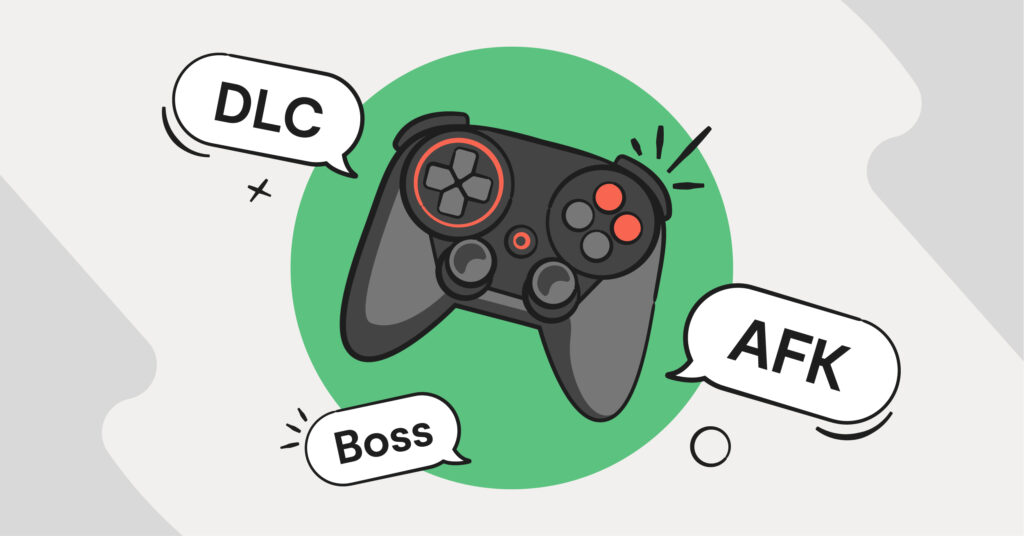
**Note: This blog post was updated on January 25, 2023.**
Gaming has come a long way since we were kids! Playing Super Mario Bros on the family TV in the living room was pretty simple, and the only gaming term you had to know was that “1-Up” meant you scored a sweet extra life. Today, many kids — and adults — play video games that connect to the internet so you can join up with other players from around the world. Throw in voice chat, and you’re completely immersed in the game, complete with its own acronyms, slang, and more.
If your kid is super into gaming, it can probably feel like they’re speaking a different language if you walk by! (And yes, it’s definitely different from plain old teen slang). To help you translate, we’ve researched the most popular gaming terms and slang phrases being used today.
Popular Gaming Terms and Acronyms
AFK — Stands for “away from keyboard” and is used when a player steps away, like “BRB.”
Avatar — What a player’s character looks like in the game. You can customize them with features, props, and clothes, and more. This is kind of like a Bitmoji — which you're probably familiar with!
Boss — The final bad guy a player has to beat in every level. They’re usually bigger, stronger, and harder to beat than the others.
Camping — When a character stays in one spot — “camps out” — to gain an unfair advantage and attack other characters without being seen.
COD — Short for "Call of Duty, " one of the most popular first-person shooter video games in history.
Crafting — The act of building virtual items in a game. For example, collecting rubbing alcohol and cloth to make a first-aid kit.
DLC — Stands for “downloadable content” that gamers can buy for a video game. It ranges from cosmetic upgrades all the way to new levels and game expansions.
DPS — Stands for “damage per second” and refers to the amount of destruction a player can exert in a single second. The higher the DPS, the more deadly the player.
Easter egg — A hard-to-find image, message, feature, or location hidden in a video game. An example would be a poster on a character’s bedroom wall that depicts the video game developer’s favorite movie.
Esports — The catch-all term for competitive, professional gaming where players (often on leagues or teams) go head-to-head for lots of money.
FPS — Stands for “first-person shooter”; a type of weapons-based game where the player sees through a character’s eyes and interacts with the world head-on.
GG — Stands for “good game”; usually said in the text chat after a game ends.
GG EZ — Stands for "good game, easy," and snarkily implies that a player had no challenge in beating their opponent.
Glitching — When a player exploits a bug (or glitch) in a video game to get an unfair advantage, like running through walls.
Griefing — Intentionally annoying, harassing, or trolling other players in a video game, usually through voice or text chat.
Killstreak — The total number of consecutive kills a player can rack up before dying themselves.
Lag — When there’s a delay between a player’s action and on-screen activity, similar to when Zoom freezes up during a call.
Lobby — A lobby is a menu screen where players wait before a game officially begins. They can learn about the next game session, look at results from the last, change settings, and talk to each other. In many games, players return to the lobby after each session. Think of it like a waiting room.
Loot — The beneficial items a player can pick up while playing, usually after killing an enemy. Ammo and health are common examples of loot that players can scavenge.
Loot boxes — An example of “pay to win” gaming, where players use real money to get randomized “loot boxes” that may contain skins, weapons, and in-game advantages. This system has come under criticism for being a little too much like gambling.
Matchmaking — The process by which a game assigns players against each other, usually taking into account skill level and ranking.
MMORPG — Stands for “massively multiplayer online role-playing game”; these are usually sci-fi or fantasy games (World of Warcraft is a good example) that allow players to interact with large numbers of other players.
Mod — Short for “modification”; refers to when a player changes an aspect of the game to create a new feature.
Noob — Refers to an inexperienced gamer; derived from “newbie.”
NPC — Stands for “non-player character”; that is, characters controlled by the computer.
OP —Stands for "overpowered," typically in reference to a gun or ammo type in the game.
PvP — Stands for “player vs. player.”
PvE — Stands for "player vs. environment." This could be a monster that players have to beat, for example.
Pwned — Pronounced “poned” (like moaned), this term is a variation of “owned” — originally from a typo because the letters P and O are next to each other on a computer keyboard. To pwn someone means to have mastery over them. Ex: “I beat you three times in a row in Fortnite! You totally got pwned!”
Rage Quit — To angrily leave a game in frustration.
Respawn — Refers to when a player comes back to life after being killed in-game.
Scrub —An insult used to demoralize another player, implying that they're bad.
Skins — Term used to describe new avatar customizations that players can buy or collect.
Squeaker — Insult typically used to describe younger gamers (because their voices aren’t deep. Note: This is generally used to make fun of male players, but there are — of course — plenty of other types of players with a range of different voices.
Sweat — Term that describes a try-hard gamer, i.e., someone who goes out of their way to win in an over-the-top, unnecessary way.
Twitch — A popular video-game streaming platform. On it, popular gamers play video games live while providing commentary and chatting with fans.
Wrekd/Wrecked — Defeated. This is often used in the expressed "get wrekd."
XP — This gaming term stands for “experience points”; they’re used to measure your progress through a game. The higher your XP, the more experience you have and the more powers you’ll unlock.
Read more
Bark helps families manage and protect their children’s digital lives.




